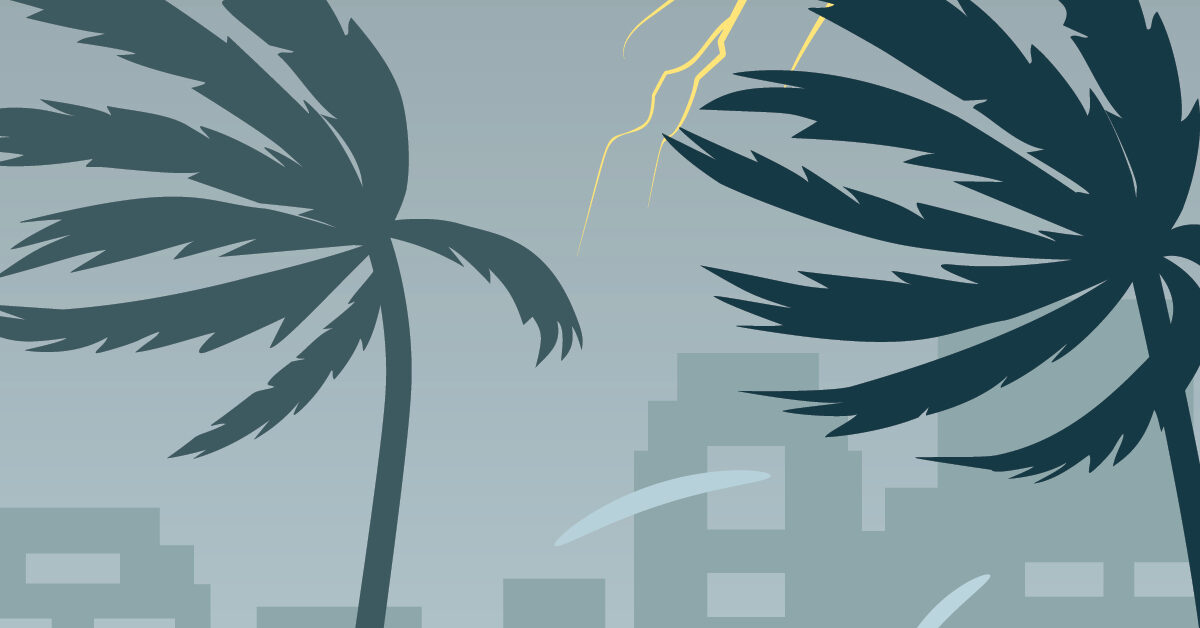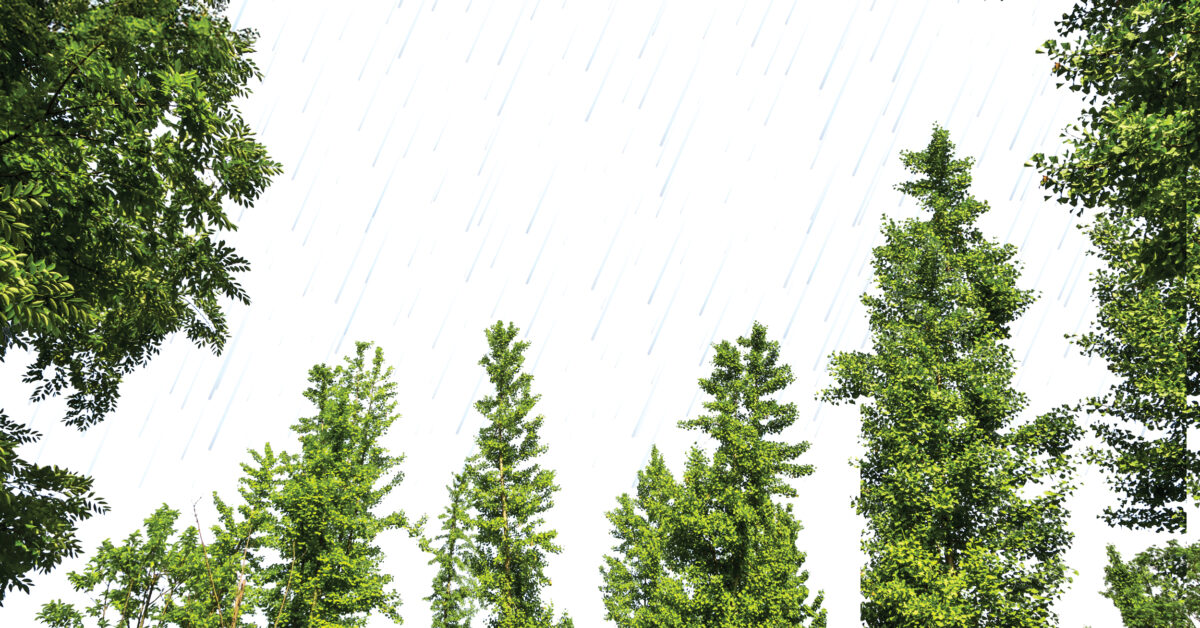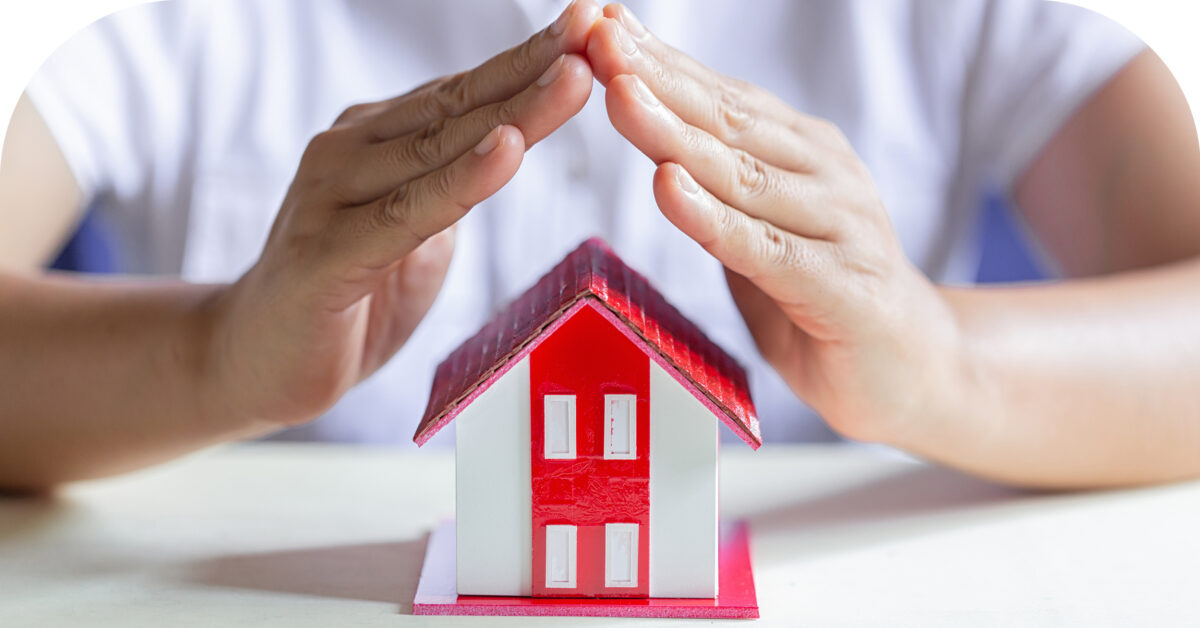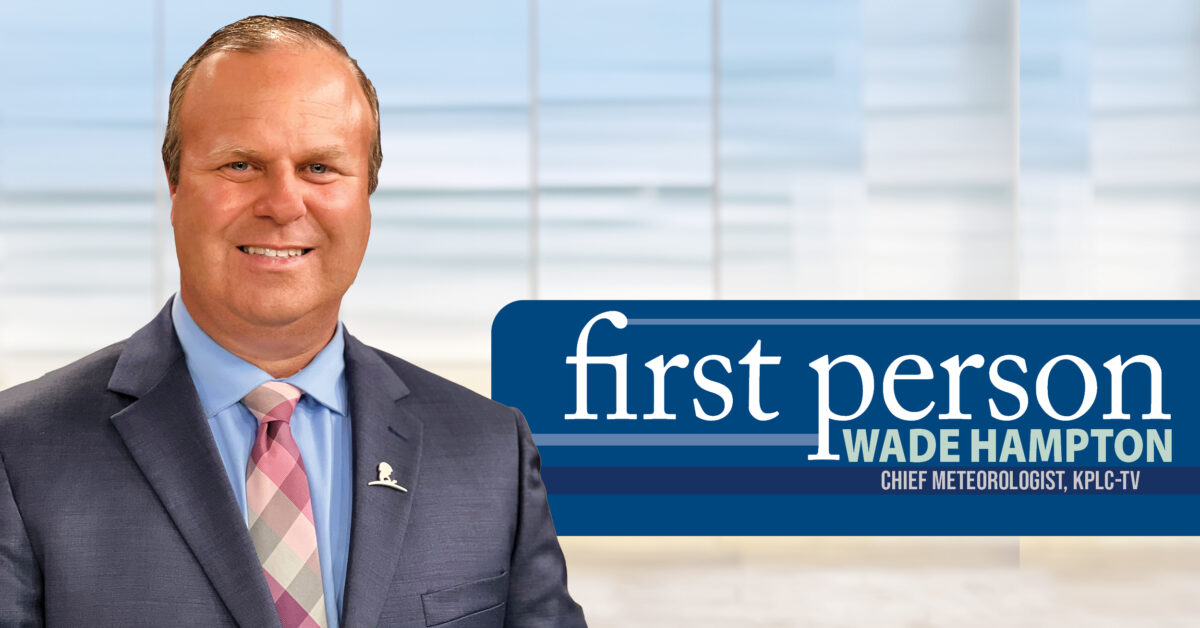
Good Tips for Red Lips
February 2023
Family Works: Tupper Homes
June 2023Our least favorite season of them all has arrived – Hurricane Season!
In Southwest Louisiana, hurricane veterans are easy to find. We’ve been through it and we’ll get through it! But, no matter how many times you’ve weathered the storm, preparation is key. From your finances to that stash of batteries, this section will give you a refresher on what to do as we all wait to welcome December 1.
2023 Hurricane Outlook
The Colorado State University Tropical Meteorology Project – one of the most widely respected forecasting groups – says this season will be “slightly below average.” The CSU team predicts 13 named storms, including six hurricanes, two of which will be major hurricanes. However, experts caution that a developing El Niño and a warm Atlantic basin brings a “larger-than-normal” level of uncertainty into the forecasting. One word of advice we should all follow is to prepare the same for every season, regardless of forecasting.
Know Your Forecast
- Category 1: 74-95 MPH
- Category 2: 96-110 MPH
- Category 3: 111–129 MPH
- Category 4: 130–156
- Category 5: 157+ MPH
- Advisory: Weather conditions are likely to occur
- Watch: Conditions are favorable for a particular weather condition
- Warning: A particular weather condition is occurring or imminent
2023 Atlantic Hurricane Names
- Arlene
- Bret
- Cindy
- Don
- Emily
- Franklin
- Gert
- Harold
- Idalia
- Jose
- Katia
- Lee
- Margot
- Nigel
- Ophelia
- Philippe
- Rina
- Sean
- Tammy
- Vince
- Whitney
Insurance Guide to Hurricane Season
by Taylor Trahan Henry
This time of year, hurricane preparation talk abounds. Batteries, check. Cases of water, check. Flashlights, check. Good to go? Not quite. One of the most important steps to take is to ensure your insurance policy covers what you need and that you understand the coverage. Lake Charles Allstate Agent, Tuwanna Guillory-August, offers questions to ask and quick tips on how to check this vital item off of your to-do list.
Is your coverage up-to-date?
This is something that should be done yearly at renewal. But, you may make changes to your home outside of that time frame. Anytime improvements or additions are made, you should contact your agent to check that your coverage amounts are still adequate. This includes the addition of contents to your home. “If you haven’t reviewed your policy in a while, don’t hesitate. Do it now,” says Guillory-August. “My team and I are ready to give you a comprehensive analysis of your homeowners insurance and we take pride in only providing you with the coverage you actually need.”
Do you have coverage for additional living expenses?
Additional living expenses coverage is intended to help with the cost of living away from your home if your house is uninhabitable due to a covered loss. This is not included on every homeowner’s policy and it may have stipulations such as saving receipts. “Our agency offers up to two full years of additional living expenses to all new home insurance policy holders,” says Guillory-August. Put in a call to your agent before the season so that, in the event of a catastrophic loss, you understand the process for making that claim and the timeframe for which your additional expenses are covered.
Do you have flood insurance?
“May 17, 2021 is still a very vivid memory for most of us,” says Guillory-August. “The flood waters came in swift and with a vengeance that day.” Most homeowner’s policies do not include flood. Oftentimes, this policy is in addition to your home insurance. One common misconception is the idea that flood insurance covers all water damage. For instance, flood insurance will cover loss as a result of rising water entering from the outside of your home. Perils like wind-driven rain or water damage following roof failure are considered a wind and hail claim. Likewise, water backups from sewer, water tanks, or other interior sources would not be covered under flood.
Renters, are you covered?
As a renter, your landlord will carry the insurance on the actual structure – apartment, condo, townhome, etc. In order for your personal belongings to be covered, you’ll need to purchase a renter’s insurance policy. These are generally inexpensive and a good way to protect your valuables and personal items in the event of damage to your housing unit. My agency offers up to one full year of Additional Living Expenses to all new renters policy holders.
Inventory Your Home
The quickest way to do this is to video a complete walkthrough of your home. Using video allows you to narrate and walk slowly through each room, opening closets and other storage areas. You could also use a camera for photos and a corresponding note pad to document contents, serial numbers, and values. Once the video or photos are complete, email them to yourself for future reference. It’s a good rule of thumb to keep receipts for large purchases like jewelry, furs, firearms, collectibles, and other high value items.
Protect Your Property
Before hurricane season, it’s wise to purchase either hurricane shutters or enough 3/4 in. plywood to cover each window of your home. Trimming trees around your home and performing general landscape cleanup of your property also goes a long way in preventing any additional hazards during dangerous winds.
This season can be a stressful time for Southwest Louisianans but knowing your protected in the event of catostrophic damage can bring peace of mind.
Tuwanna Guillory-August Allstate is located at 1700 E. Prien Lake Rd., St. 1 in
Lake Charles. For more information call 337-508-3036.
Hurricane Prep: Hurricane Help
Hearing the words “slightly below average” can bring a sigh of relief. There’s no doubt that it is welcomed news to Louisianans. However, it shouldn’t be an excuse to let your guard down. Proper preparation should still be at the top of your to-do list as we enter June. We’ve compiled a comprehensive check list and a quick reference for emergency numbers. Tuck this one away, but we hope you don’t need it!
Pack an Emergency Supply Kit
One of the first things on your hurricane prep to-do list, even before a storm looms in the Gulf of Mexico, is to assemble an emergency supply kit; something you can grab and go, if need be. A basic emergency kit could include the following items:
- Food and Water:
- One gallon of water per person per day for at least three days
- At least a three-day supply of non-perishable foods
- Pet food
- Manual can opener
- Tools and Maintenance items:
- Flashlight(s) and extra batteries
- Basic tool kit including wrench or pliers for turning off utilities, if necessary
- Dust mask to help filter contaminated air
- Plastic trash bags
- Plastic sheeting and duct tape to shelter-in-place
- Personal Items:
- Moist towelettes, toothpaste, personal hygiene products
- Glasses and contact lenses
- Sleeping bag for each person
- At least one complete change of clothing for each person
- Miscellaneous items:
- Copies of important papers such as insurance documents, medical forms, and IDs
- Paper, pencils and pens
- NOAA weather radio with tone alert (and extra batteries)
- Whistle so you can signal for help if stranded
- Maps of the local area
- Inverter or solar charger to keep mobile phones charged
- Cash or travelers’ checks
- Books, games and playing cards
- First Aid Kit:
- Latex or other sterile gloves
- Sterile dressings to stop bleeding.
- Cleansing agent/soap and antibiotic towelettes
- Antibiotic ointment
- Burn ointment
- Adhesive bandages in a variety of sizes
- Eye wash solution to flush the eyes or as general decontaminant
- A thermometer
- Prescription medications you take every day (periodically rotate medicines to account for expiration dates)
- Prescribed medical supplies such as glucose and blood pressure monitoring equipment and supplies
- Scissors and tweezers
- Petroleum jelly or other lubricant
- Non-prescription drugs: aspirin or non-aspirin pain reliever, anti-diarrhea medication, antacids, laxatives.
Last-Minute Preparations
If a storm is imminent in the next 24-48 hours and you’ve done little prior preparation, don’t panic. Here’s your last-minute list.
- Track the storm path and projected risk areas at www.nhc.noaa.gov. Monitor weather conditions with a battery-powered NOAA weather radio to receive the most up-to-date information, including forecasts, watches, or warnings.
- Turn your refrigerator to its coldest setting and keep it closed, so the food won’t spoil quickly if you lose electrical power.
- Bring all lawn furniture, outdoor decorations, trash cans, hanging plants (and anything else that could be picked up by the wind) inside. Anchor objects that cannot be brought inside.
- Fill up your bathtub, sinks and other large containers with fresh water. This will serve as an important reserve should you be without running water after a storm.
- Make sure all your family vehicles have at least a half-tank of gas, as filling stations may be closed or unable to pump gas during power outages.
Special Considerations for Apartment Dwellers
There are multiple steps those living in apartments can take in order to be prepared for when a hurricane strikes.
- First, talk to building management about an evacuation plan, including how to get out and where to go.
- Losing power and access to elevators is a big danger, especially for high-rises – so stock up and food and water for a few days, in case you can’t get out. Have extra batteries for phones and electronics.
- Bring in outdoor furniture and plants you may have on a balcony, lock your windows and stay away from them.
Numbers and Resources
- In an emergency situation, always call 911
- United Way of SWLA – 211
- Office of Homeland Security and Emergency Preparedness – 337-721-3800
- Louisiana Attorney General Hurricane Hotline – 1-866-351-4889
- LA State Police Troop D – 337-491-2511
- Calcasieu Parish Sheriff’s Office –
337-491-3600 - Road Closure Hotline – 1-800-469-4828
- American Red Cross – www.redcross.org
- FEMA – http://www.fema.gov
- LA Department of Children & Family Services — http://www.dss.state.la.us
- LA Department of Transportation –
http://www.dotd.louisiana.gov - LA Department of Health & Hospitals – http://www.dhh.state.la.us
- National Weather Service Southern Region – http://www.srh.noaa.gov
Utilities
- Entergy – 1-800-ENTERGY
- Beauregard Electric – 1-800-367-0276
- CenterPoint Energy – 1-800-477-0177
Hurricane Myths Debunked
Misconceptions swirl around tropical cyclones during hurricane season. For example, don’t ever let anyone tell you a hurricane is a Category 6. The Saffir-Simpson Hurricane Wind Scale only ranks storms to Category 5, no matter how strong the winds.
Other hurricane myths include:
- Taping windows will prevent hurricane-force winds from shattering them.
Fifty-four percent of Americans believe placing tape over their homes’ windows will protect the glass from breaking, according to the Federal Alliance for Safe Homes. Even window film sold as impact-resistant film may be an unwise option for protecting windows, because the window itself isn’t designed to withstand a hurricane. Experts consider storm shutters or plywood that cover the entire window to be safer choices. - Storing your valuables in a dishwasher will guard them from floodwater damage.
The idea behind this popular myth is that because a dishwasher is great at keeping water from escaping, it could also help prevent floodwaters from rushing inside. Despite being touted as a handy tip by a number of social media users and media outlets, the fact checkers at Snopes.com believe this so-called hurricane hack could potentially ruin your belongings. If your home can get flooded, then so can your dishwasher, according to experts. - A few days’ worth of important medication is all that’s needed ahead of a storm.
Minimizing the chance of running low on essential prescription medications will require some planning ahead in case pharmacies remain closed for weeks after a hurricane. Some states, especially states in the Gulf Coast region, are waiving the limits of pharmacy refills so patients can have refills before they would be due in order to make sure that they have enough medicine to last through a storm.
- Opening windows during a hurricane will stabilize pressure.
The belief is that you need to open up windows and garage doors to equalize pressure, but it’s not correct. Buildings aren’t airtight, and there are many little openings throughout a home that would make opening windows unnecessary. Opening windows and garage doors while a hurricane batters your home can cause much worse wind damage than otherwise would occur.
- An evacuation order was issued, but the weather looks fine. There’s no rush to leave town.
If a mandatory evacuation order is issued ahead of potential hurricane impacts, experts advise that you leave your home sooner rather than later. Officials often strongly advise against waiting until the last minute to evacuate, which potentially puts yourself in danger as well as the emergency responders who may have to rescue you during and after the storm.
Source: accuweather.com
Are Your Finances Disaster Proofed?
by Kristy Como Armand
In Southwest Louisiana, we know natural disasters come in many different forms and can strike at any time, leaving a trail of damage and financial stress behind.
“We’ve been through natural disasters and have learned the importance of being prepared,” says Dillan Rainwater, vice president with Lakeside Bank. “Every year when hurricane season begins, reminders are everywhere about disaster preparedness — keeping extra food, water and emergency supplies on hand; securing your property; and having an evacuation plan in place. What is not always mentioned are steps to take to survive financially in the event the unexpected occurs.”
During the evacuation for the Hurricane Laura in 2020, Rainwater says many people found themselves unprepared for the financial demands that follow in the days, weeks and months after the storm passed, especially with another hurricane following just six weeks later. From simple things like having enough cash on hand to more complicated issues such as accessing financial accounts and filing insurance claims, dealing with money-related issues after a natural disaster is not something anyone spends a lot of time thinking about – until the need arises. It’s important to plan ahead and put your finances on your preparedness checklist every year.”
Rainwater recommends giving some attention to the following finance-related items when organizing your personal disaster plan:
- Bring a list of your accounts.
If you have to evacuate, make sure you have a list of your checking, savings and credit card account numbers with you, along with the phone number of the financial institution, in case you need to make arrangements by phone to access your money.
- Keep important documents easily accessible.
When disaster strikes, you won’t have time to search for things like insurance policies, birth certificates, passports, wills, trust documents, records of home mortgage and improvements and any other pertinent documents. Rainwater says it’s a good idea to keep originals in a safe-deposit box, but you should also keep copies together at home in a fireproof, waterproof evacuation box or pouch you can find and grab quickly. If you’re tech-savvy, consider scanning your important documents into a computer file you can store online and/or on a jump drive. You can put any personal computer files on this as well. Again, a copy of this electronic storage device should be kept in a safe place out of your home.
- Inventory your household possessions.
Use a video camera if you have one. Otherwise, take digital photos for each item of value, including clothes, jewelry, furniture, electronics, appliances, fixtures, etc. Include a description of each and save these, along with any professional appraisals and estimates of replacement values in a safe place away from your home. Make it a point to update regularly.
- Keep some petty cash on hand for emergencies.
Depending on the nature of the disaster, ATMs might be out of commission for quite some time. You don’t want to keep too much cash on hand, but enough to get by on for a short time is a good idea. It’s also important to consider what you will do if you have to go without a paycheck for a while if your employer is affected by the disaster, or how you will cope if your direct deposit paycheck is delayed because of disaster-related electrical or automated system problems. If you can’t get back to work for an extended period, Rainwater says having an emergency fund in your bank accounts can help. A standby home equity line of credit you can tap into is also worth considering for use in emergencies.
- Have a rainy day fund for emergency situations.
Repairs after a storm or flooding disaster can be extremely costly, as can financial needs when you experience a job furlough. Rainwater says even with insurance, most hurricane deductibles can be as much as 5%, which could be thousands of dollars you’ll need to have available to get home repairs started. “This is that ‘rainy day fund’ you hear about. It should be a real thing and you should have a plan in place to regularly contribute to your emergency fund – and resist the urge to dip into it except for real emergencies.” Rainwater says a good rule of thumb is to have at least six months of regular expenses saved.






